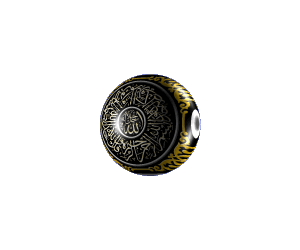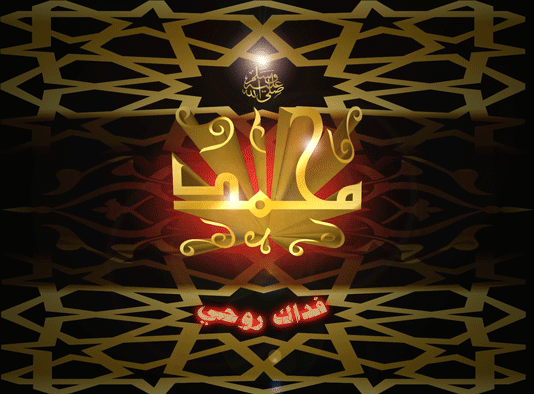In the arms of an Angel
,,Islam is the perfect cradle to grow up in this life for Hereafter, because it is the ultimate God's decision for mankind."Rahmah

The Prophet Muhammad
The Biblical prophecies on the advent of the Prophet Muhammad are evidence of the truth of Islam for people who believe in the Bible.
In Deuteronomy 18, Moses stated that God told him: "I will raise up for them a prophet like you from among their brothers; I will put my words in his mouth, and he will tell them everything I command him. If anyone does not listen to my words that the prophet speaks in my name, I myself will call him to account." (Deuteronomy 18:18-19).1
From these verses we conclude that the prophet in this prophecy must have the following three characteristics:
1) That he will be like Moses.
2) That he will come from the brothers of the Israelites, i.e. the Ishmaelites.
3) That God will put His words in to the mouth of this prophet and that he will declare what God commands him.
Let us examine these three characteristics in more depth:
1) A prophet like Moses:
There were hardly any two prophets who were so much alike as Moses and Muhammad . Both were given a comprehensive law and code of life. Both encountered their enemies and were victorious in miraculous ways. Both were accepted as prophets and statesmen. Both migrated following conspiracies to assassinate them. Analogies between Moses and Jesus overlook not only the above similarities but other crucial ones as well. These include the natural birth, the family life, and death of Moses and Muhammad but not of Jesus. Moreover Jesus was regarded by his followers as the Son of God and not exclusively as a prophet of God, as Moses and Muhammad were and as Muslims believe Jesus was. So, this prophecy refers to the Prophet Muhammad and not to Jesus, because Muhammad is more like Moses than Jesus.
Also, one notices from the Gospel of John that the Jews were waiting for the fulfillment of three distinct prophecies. The first was the coming of Christ. The second was the coming of Elijah. The third was the coming of the Prophet. This is obvious from the three questions that were posed to John the Baptist: "Now this was John's testimony, when the Jews of Jerusalem sent priests and Levites to ask him who he was. He did not fail to confess, but confessed freely, "I am not the Christ." They asked him, "Then who are you? Are you Elijah?" He said, "I am not." "Are you the Prophet?" He answered, "No." (John 1:19-21). If we look in a Bible with cross-references, we will find in the marginal notes where the words "the Prophet" occur in John 1:21, that these words refer to the prophecy of Deuteronomy 18:15 and 18:18.2 We conclude from this that Jesus Christ is not the prophet mentioned in Deuteronomy 18:18.
2) From the brothers of the Israelites:
Abraham had two sons, Ishmael and Isaac (Genesis 21). Ishmael became the grandfather of the Arab nation, and Isaac became the grandfather of the Jewish nation. The prophet spoken of was not to come from among the Jews themselves, but from among their brothers, i.e. the Ishmaelites. Muhammad , a descendant of Ishmael, is indeed this prophet.
Also, Isaiah 42:1-13 speaks of the servant of God, His "chosen one" and "messenger" who will bring down a law. "He will not falter or be discouraged till he establishes justice on earth. In his law the islands will put their hope." (Isaiah 42:4). Verse 11, connects that awaited one with the descendants of Kedar. Who is Kedar? According to Genesis 25:13, Kedar was the second son of Ishmael, the ancestor of the Prophet Muhammad .
3) God will put His words in the mouth of this prophet:
The words of God (the Holy Quran) were truly put into Muhammad's mouth. God sent the Angel Gabriel to teach Muhammad the exact words of God (the Holy Quran) and asked him to dictate them to the people as he heard them. The words are therefore not his own. They did not come from his own thoughts, but were put into his mouth by the Angel Gabriel. During the life time of Muhammad , and under his supervision, these words were then memorized and written by his companions.
Also, this prophecy in Deuteronomy mentioned that this prophet will speak the words of God in the name of God. If we looked to the Holy Quran, we will find that all its chapters, except Chapter 9, are preceded or begin with the phrase, "In the Name of God, the Most Gracious, the Most Merciful."
Another indication (other than the prophecy in Deuteronomy) is that Isaiah ties the messenger connected with Kedar with a new song (a scripture in a new language) to be sung to the Lord (Isaiah 42:10-11). This is mentioned more clearly in the prophecy of Isaiah: "and another tongue, will he speak to this people" (Isaiah 28:11 KJV). Another related point, is that the Quran was revealed in sections over a span of twenty-three years. It is interesting to compare this with Isaiah 28 which speaks of the same thing, "For it is: Do and do, do and do, rule on rule, rule on rule; a little here, a little there." (Isaiah 28:10).
Note that God has said in the prophecy of Deuteronomy 18, "If anyone does not listen to my words that the prophet speaks in my name, I myself will call him to account." (Deuteronomy, 18:19). This means that whoever believes in the Bible must believe in what this prophet says, and this prophet is the Prophet Muhammad .
source of the material is : www.islam-guide.com
In Deuteronomy 18, Moses stated that God told him: "I will raise up for them a prophet like you from among their brothers; I will put my words in his mouth, and he will tell them everything I command him. If anyone does not listen to my words that the prophet speaks in my name, I myself will call him to account." (Deuteronomy 18:18-19).1
From these verses we conclude that the prophet in this prophecy must have the following three characteristics:
1) That he will be like Moses.
2) That he will come from the brothers of the Israelites, i.e. the Ishmaelites.
3) That God will put His words in to the mouth of this prophet and that he will declare what God commands him.
Let us examine these three characteristics in more depth:
1) A prophet like Moses:
There were hardly any two prophets who were so much alike as Moses and Muhammad . Both were given a comprehensive law and code of life. Both encountered their enemies and were victorious in miraculous ways. Both were accepted as prophets and statesmen. Both migrated following conspiracies to assassinate them. Analogies between Moses and Jesus overlook not only the above similarities but other crucial ones as well. These include the natural birth, the family life, and death of Moses and Muhammad but not of Jesus. Moreover Jesus was regarded by his followers as the Son of God and not exclusively as a prophet of God, as Moses and Muhammad were and as Muslims believe Jesus was. So, this prophecy refers to the Prophet Muhammad and not to Jesus, because Muhammad is more like Moses than Jesus.
Also, one notices from the Gospel of John that the Jews were waiting for the fulfillment of three distinct prophecies. The first was the coming of Christ. The second was the coming of Elijah. The third was the coming of the Prophet. This is obvious from the three questions that were posed to John the Baptist: "Now this was John's testimony, when the Jews of Jerusalem sent priests and Levites to ask him who he was. He did not fail to confess, but confessed freely, "I am not the Christ." They asked him, "Then who are you? Are you Elijah?" He said, "I am not." "Are you the Prophet?" He answered, "No." (John 1:19-21). If we look in a Bible with cross-references, we will find in the marginal notes where the words "the Prophet" occur in John 1:21, that these words refer to the prophecy of Deuteronomy 18:15 and 18:18.2 We conclude from this that Jesus Christ is not the prophet mentioned in Deuteronomy 18:18.
2) From the brothers of the Israelites:
Abraham had two sons, Ishmael and Isaac (Genesis 21). Ishmael became the grandfather of the Arab nation, and Isaac became the grandfather of the Jewish nation. The prophet spoken of was not to come from among the Jews themselves, but from among their brothers, i.e. the Ishmaelites. Muhammad , a descendant of Ishmael, is indeed this prophet.
Also, Isaiah 42:1-13 speaks of the servant of God, His "chosen one" and "messenger" who will bring down a law. "He will not falter or be discouraged till he establishes justice on earth. In his law the islands will put their hope." (Isaiah 42:4). Verse 11, connects that awaited one with the descendants of Kedar. Who is Kedar? According to Genesis 25:13, Kedar was the second son of Ishmael, the ancestor of the Prophet Muhammad .
3) God will put His words in the mouth of this prophet:
The words of God (the Holy Quran) were truly put into Muhammad's mouth. God sent the Angel Gabriel to teach Muhammad the exact words of God (the Holy Quran) and asked him to dictate them to the people as he heard them. The words are therefore not his own. They did not come from his own thoughts, but were put into his mouth by the Angel Gabriel. During the life time of Muhammad , and under his supervision, these words were then memorized and written by his companions.
Also, this prophecy in Deuteronomy mentioned that this prophet will speak the words of God in the name of God. If we looked to the Holy Quran, we will find that all its chapters, except Chapter 9, are preceded or begin with the phrase, "In the Name of God, the Most Gracious, the Most Merciful."
Another indication (other than the prophecy in Deuteronomy) is that Isaiah ties the messenger connected with Kedar with a new song (a scripture in a new language) to be sung to the Lord (Isaiah 42:10-11). This is mentioned more clearly in the prophecy of Isaiah: "and another tongue, will he speak to this people" (Isaiah 28:11 KJV). Another related point, is that the Quran was revealed in sections over a span of twenty-three years. It is interesting to compare this with Isaiah 28 which speaks of the same thing, "For it is: Do and do, do and do, rule on rule, rule on rule; a little here, a little there." (Isaiah 28:10).
Note that God has said in the prophecy of Deuteronomy 18, "If anyone does not listen to my words that the prophet speaks in my name, I myself will call him to account." (Deuteronomy, 18:19). This means that whoever believes in the Bible must believe in what this prophet says, and this prophet is the Prophet Muhammad .
source of the material is : www.islam-guide.com
hadith 1: Actions are judged by intentions
It is narrated on the authority of Amirul Mu'minin, Abu Hafs 'Umar bin al-Khattab, radiyallahu 'anhu, who said: I heard the Messenger of Allah, sallallahu 'alayhi wasallam, say:
"Actions are (judged) by motives (niyyah), so each man will have what he intended. Thus, he whose migration (hijrah) was to Allah and His Messenger, his migration is to Allah and His Messenger; but he whose migration was for some worldly thing he might gain, or for a wife he might marry, his migration is to that for which he migrated."
[Al-Bukhari & Muslim
This hadith was said by the Prophet, sallallahu 'alayhi wasallam, at the time when a man emigrated from Makkah to Madinah during the Hijrah for the sake of marrying someone and not for the sake of Islam.
It is considered to be one of the greatest hadiths in Islam
Al-Imam Ahmad (with reference to al-Imam al-Shafie's statement) said: Islam is based on three fundamentals (all are among the 40 hadiths ):
Hadith 1: which is stated above.
Hadith 5: "Whosoever introduces into this affair of ours (i.e. Islam) something that does not belong to it, it is to be rejected."
Hadith 6: "Truly, what is lawful is evident, and what is unlawful is evident, and in between the two are matters which are doubtful which many people do not know……"
These three hadiths are agreed upon by Al-Bukhari and Muslim.
These hadiths can be seen as three criteria to help Muslims evaluate and judge what they do and say "as an ibadah" in their daily life:
Hadith 1 - To evaluate and judge our internal actions (actions of the heart).
Hadith 5 - To evaluate and judge our external actions (actions of the limbs).
Hadith 6 - To evaluate and judge our dealings "mu'amalat" (interaction between people).
Niyyah (intention) has two meanings:
The intention before an ibadah (e.g. prayer)
The willingness
The second meaning (ii.) is what is meant in this hadith.
To achieve ikhlas, we have to avoid shirk (associating others with Allah, which causes insincerity). Al-Imam al-Harawi said the root cause for insincerity (or shirk) is self-desire (al-hawa). Therefore no action should be done because of self-desire.
Imam al-Harawi states that there are 7 types of self-desires:-
To make oneself appear good in the hearts of others
To seek the praises of others
To avoid being blamed by others
To seek the glorification of others
To seek the wealth/money of others
To seek the services or love of others
To seek the help of others for oneself
Ways to obtain ikhlas:
Do righteous deeds - the more good deeds we do and hence get closer to Allah, the more sincere we will be.
Before we do any deed we should firstly seek knowledge (ilm) - our actions/deeds should be guided by knowledge so that we do them in accordance to the Shariah.
Do not give false impressions - do not make others believe that an action we did was good when it was not.
Al-Imam Ahmad said: Before you do anything, check your intention (niyyah) - ask yourself before performing an action: "Is it for the sake of Allah?"
Ibnu al-Qayyim says: Any action we do is subject to three defects:
Being conscious that others are observing our actions
Seeking a return (benefit/reward) for the action
Being satisfied with the action
There are four things that contradict ikhlas:
Ma'siat - committing sins - this will weaken our ikhlas
Shirk - associating others with Allah
Riya' - performing an ibadah with the intention of showing off to others
Nifaq - hypocrisy
Even though we must always make sure that our actions do not deviate from ikhlas, there are actions, which are automatically considered that of good intentions. For example, seeking knowledge in Islam, helping the community, doing da'wah, etc.
conclusion
Our actions are undermined by our intentions - whether they are good intentions or bad intentions. Therefore we should always check our intentions before we do or say anything. We must make sure that the action is for the sake of Allah so that it is accepted by Allah and that we will be rewarded for it, insha Allah.
source: Commentary on the Forty Hadith of Al-Nawawi
It is narrated on the authority of Amirul Mu'minin, Abu Hafs 'Umar bin al-Khattab, radiyallahu 'anhu, who said: I heard the Messenger of Allah, sallallahu 'alayhi wasallam, say:
"Actions are (judged) by motives (niyyah), so each man will have what he intended. Thus, he whose migration (hijrah) was to Allah and His Messenger, his migration is to Allah and His Messenger; but he whose migration was for some worldly thing he might gain, or for a wife he might marry, his migration is to that for which he migrated."
[Al-Bukhari & Muslim
This hadith was said by the Prophet, sallallahu 'alayhi wasallam, at the time when a man emigrated from Makkah to Madinah during the Hijrah for the sake of marrying someone and not for the sake of Islam.
It is considered to be one of the greatest hadiths in Islam
Al-Imam Ahmad (with reference to al-Imam al-Shafie's statement) said: Islam is based on three fundamentals (all are among the 40 hadiths ):
Hadith 1: which is stated above.
Hadith 5: "Whosoever introduces into this affair of ours (i.e. Islam) something that does not belong to it, it is to be rejected."
Hadith 6: "Truly, what is lawful is evident, and what is unlawful is evident, and in between the two are matters which are doubtful which many people do not know……"
These three hadiths are agreed upon by Al-Bukhari and Muslim.
These hadiths can be seen as three criteria to help Muslims evaluate and judge what they do and say "as an ibadah" in their daily life:
Hadith 1 - To evaluate and judge our internal actions (actions of the heart).
Hadith 5 - To evaluate and judge our external actions (actions of the limbs).
Hadith 6 - To evaluate and judge our dealings "mu'amalat" (interaction between people).
Niyyah (intention) has two meanings:
The intention before an ibadah (e.g. prayer)
The willingness
The second meaning (ii.) is what is meant in this hadith.
To achieve ikhlas, we have to avoid shirk (associating others with Allah, which causes insincerity). Al-Imam al-Harawi said the root cause for insincerity (or shirk) is self-desire (al-hawa). Therefore no action should be done because of self-desire.
Imam al-Harawi states that there are 7 types of self-desires:-
To make oneself appear good in the hearts of others
To seek the praises of others
To avoid being blamed by others
To seek the glorification of others
To seek the wealth/money of others
To seek the services or love of others
To seek the help of others for oneself
Ways to obtain ikhlas:
Do righteous deeds - the more good deeds we do and hence get closer to Allah, the more sincere we will be.
Before we do any deed we should firstly seek knowledge (ilm) - our actions/deeds should be guided by knowledge so that we do them in accordance to the Shariah.
Do not give false impressions - do not make others believe that an action we did was good when it was not.
Al-Imam Ahmad said: Before you do anything, check your intention (niyyah) - ask yourself before performing an action: "Is it for the sake of Allah?"
Ibnu al-Qayyim says: Any action we do is subject to three defects:
Being conscious that others are observing our actions
Seeking a return (benefit/reward) for the action
Being satisfied with the action
There are four things that contradict ikhlas:
Ma'siat - committing sins - this will weaken our ikhlas
Shirk - associating others with Allah
Riya' - performing an ibadah with the intention of showing off to others
Nifaq - hypocrisy
Even though we must always make sure that our actions do not deviate from ikhlas, there are actions, which are automatically considered that of good intentions. For example, seeking knowledge in Islam, helping the community, doing da'wah, etc.
conclusion
Our actions are undermined by our intentions - whether they are good intentions or bad intentions. Therefore we should always check our intentions before we do or say anything. We must make sure that the action is for the sake of Allah so that it is accepted by Allah and that we will be rewarded for it, insha Allah.
source: Commentary on the Forty Hadith of Al-Nawawi

The Revelation of the Holy Quran
Narrated 'Aisha: (the mother of the faithful believers) The commencement of the Divine Inspiration to Allah's Apostle was in the form of good dreams which came true like bright day light, and then the love of seclusion was bestowed upon him. He used to go in seclusion in the cave of Hira where he used to worship (Allah alone) continuously for many days before his desire to see his family. He used to take with him the journey food for the stay and then come back to (his wife) Khadija to take his food like-wise again till suddenly the Truth descended upon him while he was in the cave of Hira. The angel came to him and asked him to read. The Prophet replied, "I do not know how to read. The Prophet added, "The angel caught me (forcefully) and pressed me so hard that I could not bear it any more. He then released me and again asked me to read and I replied, 'I do not know how to read.' Thereupon he caught me again and pressed me a second time till I could not bear it any more. He then released me and again asked me to read but again I replied, 'I do not know how to read (or what shall I read)?' Thereupon he caught me for the third time and pressed me, and then released me and said, 'Read in the name of your Lord, who has created (all that exists) has created man from a clot. Read! And your Lord is the Most Generous." (96.1, 96.2, 96.3) Then Allah's Apostle returned with the Inspiration and with his heart beating severely. Then he went to Khadija bint Khuwailid and said, "Cover me! Cover me!" They covered him till his fear was over and after that he told her everything that had happened and said, "I fear that something may happen to me." Khadija replied, "Never! By Allah, Allah will never disgrace you. You keep good relations with your Kith and kin, help the poor and the destitute, serve your guests generously and assist the deserving calamity-afflicted ones." Khadija then accompanied him to her cousin Waraqa bin Naufal bin Asad bin 'Abdul 'Uzza, who, during the PreIslamic Period became a Christian and used to write the writing with Hebrew letters. He would write from the Gospel in Hebrew as much as Allah wished him to write. He was an old man and had lost his eyesight. Khadija said to Waraqa, "Listen to the story of your nephew, O my cousin!" Waraqa asked, "O my nephew! What have you seen?" Allah's Apostle described whatever he had seen. Waraqa said, "This is the same one who keeps the secrets (angel Gabriel) whom Allah had sent to Moses. I wish I were young and could live up to the time when your people would turn you out." Allah's Apostle asked, "Will they drive me out?" Waraqa replied in the affirmative and said, "Anyone (man) who came with something similar to what you have brought was treated with hostility; and if I should remain alive till the day when you will be turned out then I would support you strongly." But after a few days Waraqa died and the Divine Inspiration was also paused for a while. Narrated Jabir bin 'Abdullah Al-Ansari while talking about the period of pause in revelation reporting the speech of the Prophet "While I was walking, all of a sudden I heard a voice from the sky. I looked up and saw the same angel who had visited me at the cave of Hira' sitting on a chair between the sky and the earth. I got afraid of him and came back home and said, 'Wrap me (in blankets).' And then Allah revealed the following Holy Verses (of Quran): 'O you (i.e. Muhammad)! wrapped up in garments!' Arise and warn (the people against Allah's Punishment),... up to 'and desert the idols.' (74.1-5) After this the revelation started coming strongly, frequently and regularly."
translation of Dr. Muhammad Muhsin Khan
source: www.searchtruth.com
Narrated 'Aisha: (the mother of the faithful believers) The commencement of the Divine Inspiration to Allah's Apostle was in the form of good dreams which came true like bright day light, and then the love of seclusion was bestowed upon him. He used to go in seclusion in the cave of Hira where he used to worship (Allah alone) continuously for many days before his desire to see his family. He used to take with him the journey food for the stay and then come back to (his wife) Khadija to take his food like-wise again till suddenly the Truth descended upon him while he was in the cave of Hira. The angel came to him and asked him to read. The Prophet replied, "I do not know how to read. The Prophet added, "The angel caught me (forcefully) and pressed me so hard that I could not bear it any more. He then released me and again asked me to read and I replied, 'I do not know how to read.' Thereupon he caught me again and pressed me a second time till I could not bear it any more. He then released me and again asked me to read but again I replied, 'I do not know how to read (or what shall I read)?' Thereupon he caught me for the third time and pressed me, and then released me and said, 'Read in the name of your Lord, who has created (all that exists) has created man from a clot. Read! And your Lord is the Most Generous." (96.1, 96.2, 96.3) Then Allah's Apostle returned with the Inspiration and with his heart beating severely. Then he went to Khadija bint Khuwailid and said, "Cover me! Cover me!" They covered him till his fear was over and after that he told her everything that had happened and said, "I fear that something may happen to me." Khadija replied, "Never! By Allah, Allah will never disgrace you. You keep good relations with your Kith and kin, help the poor and the destitute, serve your guests generously and assist the deserving calamity-afflicted ones." Khadija then accompanied him to her cousin Waraqa bin Naufal bin Asad bin 'Abdul 'Uzza, who, during the PreIslamic Period became a Christian and used to write the writing with Hebrew letters. He would write from the Gospel in Hebrew as much as Allah wished him to write. He was an old man and had lost his eyesight. Khadija said to Waraqa, "Listen to the story of your nephew, O my cousin!" Waraqa asked, "O my nephew! What have you seen?" Allah's Apostle described whatever he had seen. Waraqa said, "This is the same one who keeps the secrets (angel Gabriel) whom Allah had sent to Moses. I wish I were young and could live up to the time when your people would turn you out." Allah's Apostle asked, "Will they drive me out?" Waraqa replied in the affirmative and said, "Anyone (man) who came with something similar to what you have brought was treated with hostility; and if I should remain alive till the day when you will be turned out then I would support you strongly." But after a few days Waraqa died and the Divine Inspiration was also paused for a while. Narrated Jabir bin 'Abdullah Al-Ansari while talking about the period of pause in revelation reporting the speech of the Prophet "While I was walking, all of a sudden I heard a voice from the sky. I looked up and saw the same angel who had visited me at the cave of Hira' sitting on a chair between the sky and the earth. I got afraid of him and came back home and said, 'Wrap me (in blankets).' And then Allah revealed the following Holy Verses (of Quran): 'O you (i.e. Muhammad)! wrapped up in garments!' Arise and warn (the people against Allah's Punishment),... up to 'and desert the idols.' (74.1-5) After this the revelation started coming strongly, frequently and regularly."
translation of Dr. Muhammad Muhsin Khan
source: www.searchtruth.com



